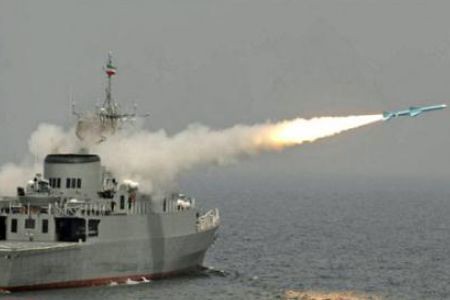
Iran naval manuevers in the Straits of Hormuz could be a warning that it can block oil shipments through the strategic waterways. Iran has been under threat from the US and Israel., a photo by Pan-African News Wire File Photos on Flickr.
Iran to File Motion in U.S. Court to Unfreeze Funds
By JAY SOLOMON
Wall Street Journal
WASHINGTON—Iran's central bank is preparing to file a motion in a New York federal court early next year to release nearly $2 billion of its frozen funds at Citigroup Inc.'s Citibank unit, according to attorneys for the Iranian bank.
Tehran's action will mark the latest step in a widening legal struggle for control of the money.
The assets were frozen in 2008 after a group of more than 1,000 victims of international terrorism sought the funds as partial payment for a $2.7 billion legal judgment made against Tehran for its alleged role in the 1983 bombing of a Marine Corps barracks in Beirut that killed 241 servicemen.
A federal judge's decision to freeze the funds from the central bank, known as Bank Markazi, was the largest seizure of Iranian funds outside Iran since the 1979 Islamic revolution. The funds were deposited in Citibank by Luxembourg-based Clearstream Banking SA.
Bank Markazi has emerged as a target in the West's financial war against Iran, which is partly aimed at forcing Tehran to end its production of nuclear fuel.
U.S. President Barack Obama is scheduled to sign new legislation that will ban any business dealings with Bank Markazi, which conducts the majority of Iran's oil sales. The European Union also is considering blacklisting Bank Markazi, as well as imposing an embargo on all purchases of Iranian energy, in a bid to end Tehran's nuclear program and support for Middle East-based militant groups.
Lawyers representing Bank Markazi are arguing in the U.S. Court for the Southern District of New York that freezing the Iranian funds is illegal under U.S. law, according to recently unsealed court documents. These lawyers cite the Foreign Sovereign Immunities Act as safeguarding from seizure by litigants the holdings inside the U.S. of any foreign central bank.
Bank Markazi's counsel plans to file a motion in early February to release the funds on these grounds. "Bank Markazi will show that its property is immune from seizure," said David Lindsey of Chaffetz Lindsey LLP, the law firm representing the Iranian central bank.
Lawyers for the terrorism victims believe the new U.S. legislation blacklisting Bank Markazi will strengthen their case for claiming the funds at Citibank.
The 2008 decision by a New York judge to freeze Bank Markazi's assets used information from the U.S. Treasury Department, according to court documents. Treasury showed Bank Markazi deposited debt instruments with the Luxembourg-based financial-services company Clearstream, which placed the securities in the account at Citibank.
The New York court later ordered that $250 million be released on the grounds it didn't ultimately belong to Iran. But lawyers representing the terrorism victims' families have sued Clearstream and a Rome-based trade bank, Banca UBAE, for allegedly fraudulently covering up Iran's ownership of these funds.
Banca UBAE had been controlled by the late Libyan dictator Moammar Gadhafi before his government was overthrown this year.
A spokesman for Banca UBAE in Rome declined to comment.
Clearstream has declined to comment on ongoing litigation. The company said in court filings the money held at its accounts at Citibank was Clearstream's property and not Iran's. Clearstream has argued in the New York court that the nearly $2 billion should be released because the bank was protected by Luxembourg banking laws.
Tensions between the West and Iran have intensified in recent weeks due to the international efforts to target Bank Markazi and Tehran's oil revenues. Senior Iranian officials said this week that Iran's navy would stop the flow of international shipping through the strategic Strait of Hormuz if the oil embargo went through. Roughly 15 million barrels of oil pass through the waterway every day.
On Thursday, Italian Prime Minister Mario Monti said his government will support further sanctions against Iran, as long as they exclude oil supplies to Italy's biggest energy company that constitute repayment for work the firm did in the Islamic republic.
"There is strong concern on the advancement of Iran's nuclear program reaching a point of nonreturn and the strategy, which Italy agrees with, is the urgency to strengthen instruments of pressure on Iran," he told a news conference.
Write to Jay Solomon at jay.solomon@wsj.com
No comments:
Post a Comment